- Despite haven status and dollar weakness, gold slump continues
- On Friday, oil climbed on vaccine progress even as stocks fell on lockdown distress
COVID-19 is likely to remain the dominant market theme in the coming, holiday-shortened week. The rising trajectory of the pandemic versus ongoing progress toward a vaccine will cause investors to whipsaw wildly between pessimism and optimism, driving markets lower or higher depending on prevailing sentiment.
Last week played out much as we predicted, when positive vaccine news dominated headlines, stocks advanced. But when the focus shifted to the unbridled rate of global and domestic contagion and stricter lockdowns, stocks sold off. Proving the point yet again on Friday, US coronavirus infections were headed toward the 12 million mark, with nearly 200,000 new cases reported on Friday, and stocks were mostly sold-off to finish the trading week.
Sector Rotation Fluctuates But Biotechs Rise
Losses for some US indices deepened on Friday. The S&P 500 and Dow Jones Industrial Average both ended the week lower; the NASDAQ dipped on Friday but was still up 0.2% for the week. The small cap Russell 2000, however, remained in positive territory all week.
Adding to the already significant pressure on stocks, conflict over the use of Federal Reserve funds overshadowed any positive news from the pharmaceuticals sector. Thursday, Treasury Secretary Steven Mnuchin requested the Fed return funds set aside for emergency lending, setting up the expiration of several relief programs by Dec. 31.
The Fed argued for extending “the full suite of emergency facilities,” and has no legal obligation to refund the Treasury's investment. However, in a letter on Friday To Mnuchin, Fed Chairman Jerome Powell said the central bank will "work out arrangements with you for returning the unused portions of the funds."
The rotation out of big tech shares, into sectors sensitive to an expanding economic cycle fluctuated throughout the week. This shift—between growth and value stocks such as those in the energy and financials sectors—will continue. Another type of rotation has also been taking place, a move into small caps and international shares and away from US large and mega cap stocks. Finally, there's a third, less visible rotation also occurring, between different investment styles: a move into dividend income shares and away from capital appreciation stocks.
As well, biotech shares remained headline sensitive.
Pfizer (NYSE:PFE) and German vaccine-development partner BioNTech (NASDAQ:BNTX) both gained after they submitted an emergency authorization request on Friday with the US's Food and Drug Administration (FDA) for rapid approval for their coronavirus inoculation.
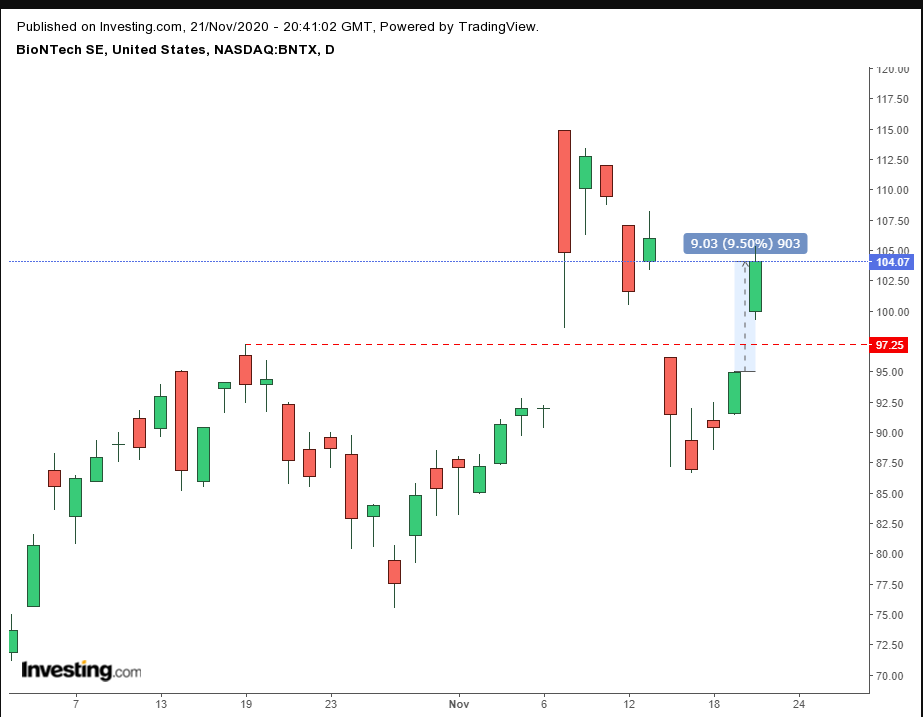
Technically, BioNtech soared +9.5%, completing a bullish Island Reversal. Pfizer, however, added only 1.4%, having given up a 3.1% advance.
Shares of Gilead Sciences (NASDAQ:GILD) dropped after the World Health Organization (WHO) advised doctors not to administer the Foster City, California-based biopharmaceutical company's remdesivir, even after the US FDA approved it for hospitalized patients. WHO said there was no evidence for improved patient survival.
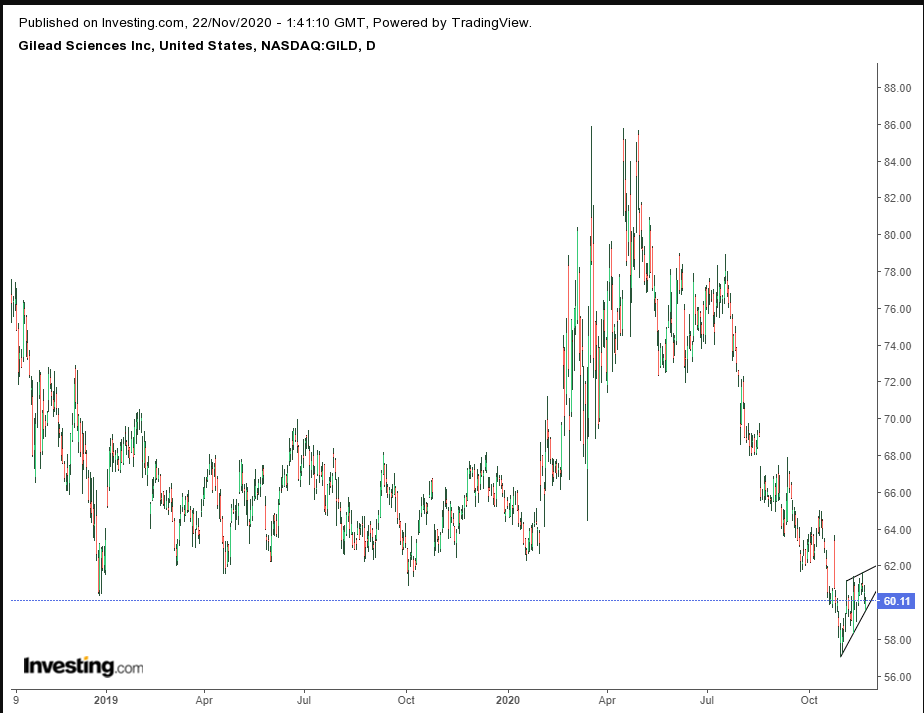
GILD price pressed against the bottom of a bearish flag, confirming the previous broken support, in place since Dec. 20, 2018.
Of course, we’ve been warning for some time now that whatever apparent progress pharmaceutical companies make in the fight against coronovirus, it doesn’t mean the worst pandemic in a century will magically disappear. Experts are predicting it will take four to six months at the very least for life to return to some sort of pre-pandemic normal.
Last week's initial jobless claims data was worse than anticipated, suggesting a choppier recovery than had been hoped for.
For all the volatility last week, the VIX ended dropping for a second week.
Yields, including for the 10-year Treasury benchmark note, erased a weekly loss.
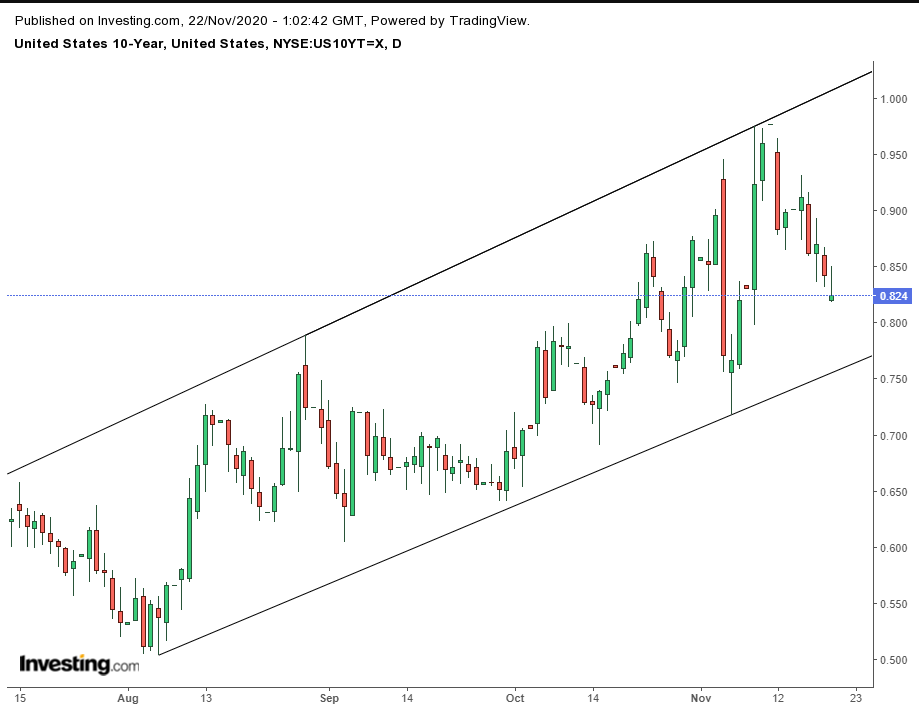
On Friday, rates formed an inverted hammer upon a return to the bottom of a rising channel, suggesting a continued rise.
The dollar fell throughout the week.
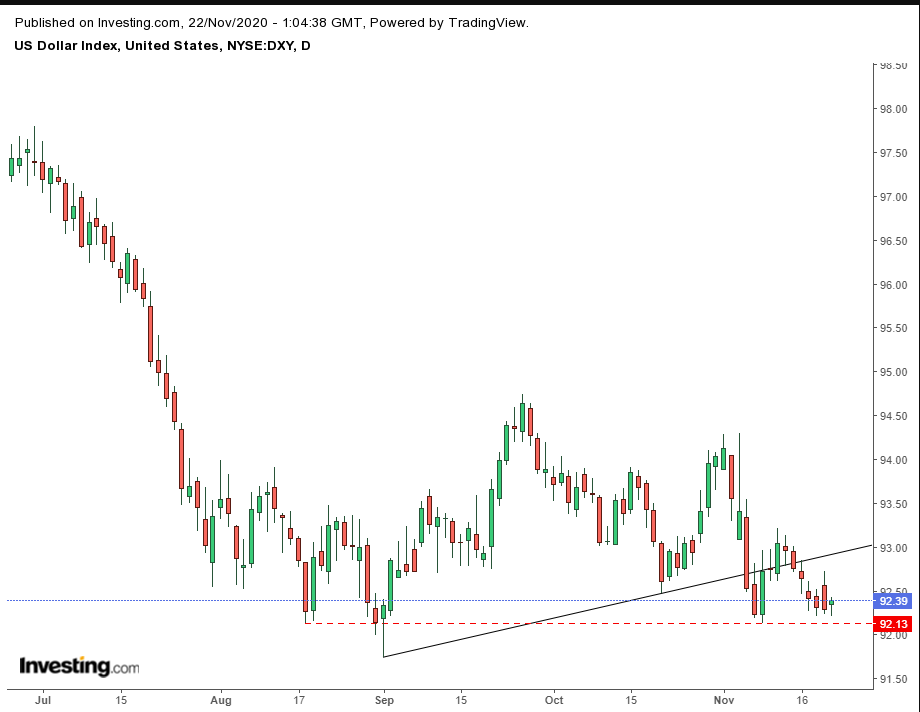
This strengthened the resistance of a H&S neckline but hammered out a support at the initial penetration’s low, which coincides with the lows before forming the neckline.
Gold was up Friday but down for the week, even though both the dollar and stocks were lower as well.
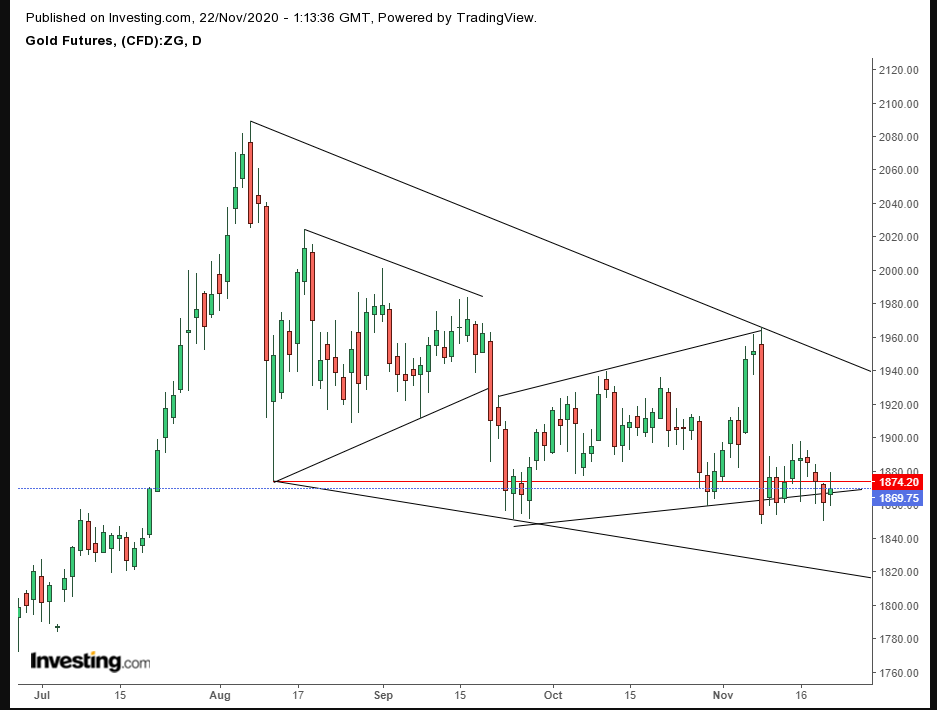
This is the second time we’ve noticed gold being sold off while it should have risen either on its safe haven status, when stocks were down, or on a falling dollar.
Also, technically, the precious metal continued to elude our calls; after shifting between different patterns we remain expectant of an upside breakout of a falling wedge.
Bitcoin extended an advance for a seventh consecutive week, its longest upside run since May. Last week, the digital currency gained 16.2%, its best week since June 2019. The cryptocurrency reached a three-year high, nearing its all-time record of close to $20,000, hit during December 2017. The upmove notwithstanding, we consider Bitcoin overbought.
The Energy Information Administration reported that commercial crude oil inventories rose by 4.3 million barrels to 4.887 barrels, while analysts had anticipated a drop of 913,000.
Cushing oil inventories jumped 61.6 million barrels, bringing crude stocks to 81% capacity, or 76 million barrels. This is nearing its highest levels since April when a lack of storage space amid evaporating demand sent the price of oil into subzero territory.
Nevertheless, the price of oil jumped on Friday, to lock in a third weekly advance on the hopes that the two recent vaccine developments will eventually help spur the global economy and thus demand.
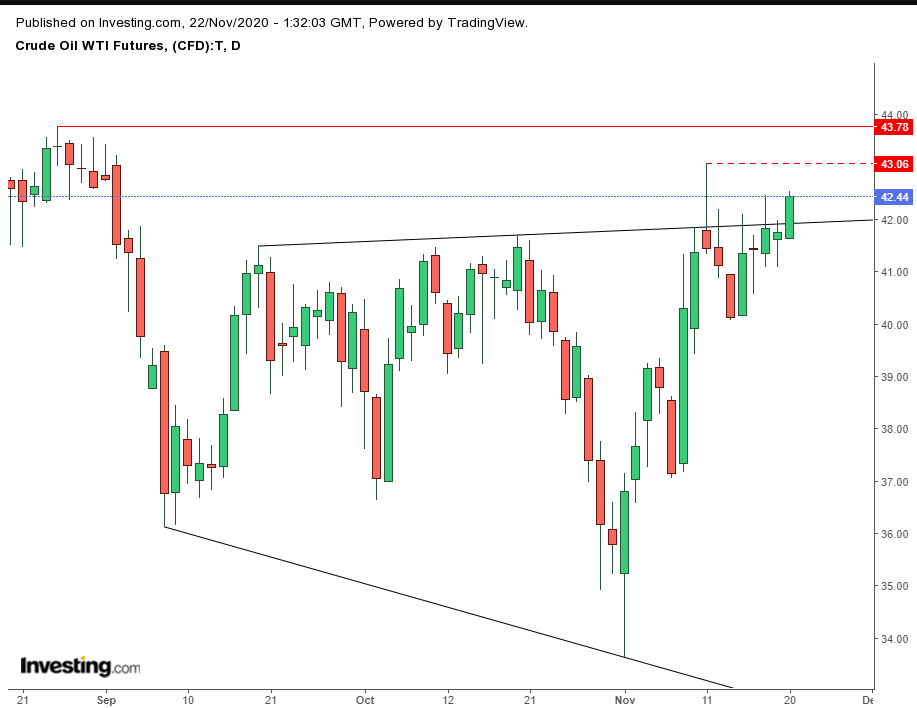
Technically, the price is forcing against the range top since Sept. 18. It needs to rise above the Nov. 11 shooting star and the rising wedge top to clear out any lagging supply. Otherwise, we expect it to return to the range, with momentum potentially pushing oil back toward $36.
Week Ahead
All times listed are EST
Monday
Japan's markets closed for the Workers Day holiday
3:30: Germany – Manufacturing PMI: seen to decline to 56.5 from 58.2.
4:30: UK – Manufacturing PMI: anticipated to remain flat at 53.3.
4:30: UK – Services PMI: expected to stay at 52.3.
9:45: US – Manufacturing PMI: likely slipped to 53.0 from 53.4.
Tuesday
2:00: Germany – GDP: expected to have remained steady at 8.2% in Q3.
4:00: Germany – Ifo Business Climate Index: probably slipped to 90.7 from 92.7
9:00: Eurozone – ECB President Lagarde Speaks
10:00: US – CB Consumer Confidence: seen to decline to 98.0 from 100.9.
Wednesday
8:30: US – Core Durable Goods Orders: anticipated to drop to 0.4% from 0.8%.
8:30: US – GDP: likely to have remained flat at 33.1% in Q3.
8:30: US – Initial Jobless Claims: expected to slacken to 725K from 742K.
10:00: US – New Home Sales: forecast to increase to 975K from 959K.
14:00: US – FOMC Meeting Minutes
Thursday
US markets closed for the Thanksgiving Day holiday
6:30: Eurozone – ECB Publishes Account of Monetary Policy Meeting
7:30: Eurozone – ECB Monetary Policy Statement
20:00: Japan – Tokyo Core CPI: seen to have dropped to -0.7% from -0.5%.
Friday
2:00: UK – Nationwide HPI: anticipated to have contracted to 0.2% from 0.8%.
